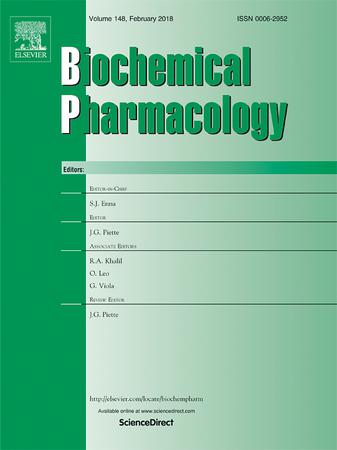Increased glucose utilization is a targetable vulnerability to overcome drug resistance associated with neddylation blockade
IF 5.3
2区 医学
Q1 PHARMACOLOGY & PHARMACY
引用次数: 0
Abstract
Gastric cancer, a leading cause of cancer-related mortality, has a median survival of just 15 months in advanced stages and currently lacks effective treatment options. Neddylation blockade is a promising therapeutic strategy, yet its clinical application faces challenge with the emergence of drug resistance. Currently, the underlying mechanisms behind the drug resistance are not fully understood. Our study uncovers the link between MLN4924-induced metabolic reprogramming and its antitumor efficacy in gastric cancer cells. We first demonstrated that MLN4924, a neddylation blocker, has multiple effects on gastric cancer cell growth, notably inducing mitochondrial damage. Untargeted metabolomic analysis revealed that MLN4924 enhances glucose utilization in gastric cancer cells in a concentration-dependent manner. Mechanistically, MLN4924 reduces the neddylation of cullin2, thereby inhibiting the degradation of HIF-1α. This leads to the accumulation of HIF-1α, which upregulates GLUT1 levels and facilitates increased glucose uptake. This metabolic adaptation allows gastric cancer cells to maintain their energy supply despite mitochondrial impairment. Based on the increased glucose dependency following neddylation inhibition by MLN4924, we propose a co-targeting strategy with GLUT1 inhibition, which significantly improves therapeutic efficacy in vitro and in vivo models without safety risks. This dual-targeting approach represents a potent new strategy for gastric cancer treatment.

求助全文
约1分钟内获得全文
求助全文
来源期刊

Biochemical pharmacology
医学-药学
CiteScore
10.30
自引率
1.70%
发文量
420
审稿时长
17 days
期刊介绍:
Biochemical Pharmacology publishes original research findings, Commentaries and review articles related to the elucidation of cellular and tissue function(s) at the biochemical and molecular levels, the modification of cellular phenotype(s) by genetic, transcriptional/translational or drug/compound-induced modifications, as well as the pharmacodynamics and pharmacokinetics of xenobiotics and drugs, the latter including both small molecules and biologics.
The journal''s target audience includes scientists engaged in the identification and study of the mechanisms of action of xenobiotics, biologics and drugs and in the drug discovery and development process.
All areas of cellular biology and cellular, tissue/organ and whole animal pharmacology fall within the scope of the journal. Drug classes covered include anti-infectives, anti-inflammatory agents, chemotherapeutics, cardiovascular, endocrinological, immunological, metabolic, neurological and psychiatric drugs, as well as research on drug metabolism and kinetics. While medicinal chemistry is a topic of complimentary interest, manuscripts in this area must contain sufficient biological data to characterize pharmacologically the compounds reported. Submissions describing work focused predominately on chemical synthesis and molecular modeling will not be considered for review.
While particular emphasis is placed on reporting the results of molecular and biochemical studies, research involving the use of tissue and animal models of human pathophysiology and toxicology is of interest to the extent that it helps define drug mechanisms of action, safety and efficacy.
 求助内容:
求助内容: 应助结果提醒方式:
应助结果提醒方式:


